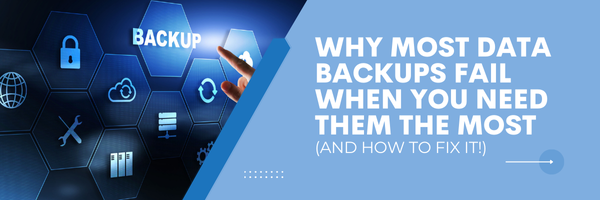Data backups are crucial for protecting your information in your business. Backups safeguard critical business information from being lost due to a number of issues, including accidental deletion, hardware failures, software issues, natural disasters, cyberattacks or system crashes. Data backups are also an important aspect of business since many industries have regulations requiring data retention and protection. Backups are also essential when it comes to business continuity in the face of unexpected disruptions.
However, and unfortunately, many backups fail just when you need them the most. Let’s explore why this happens and how you can avoid these pitfalls.
Common Reasons for Backup Failures (and how to stop those failures from happening)
1. Human Error
Mistakes happen. Whether it’s forgetting to schedule a backup or accidentally deleting files, human error is a leading cause of backup failures.
- HOW TO FIX IT: To help combat this issues, regular training and automated systems are good tactics to implement. It’s also a good idea to have multiple humans involved in data backup to help with not missing steps.
2. Outdated Technology
Using outdated software or hardware can lead to compatibility issues and failures.
- HOW TO FIX IT: Ensure your backup solutions are up-to-date and compatible with your current systems. Confer with your technology team or managed services provider, like Atlantic Technology Services, on what the best devices and technology are for your business need.
3. Insufficient Testing
Many businesses set up backups but fail to test them regularly. Without testing, you won’t know if your backup is reliable until it’s too late.
- HOW TO FIX IT: Schedule regular tests to ensure everything works as expected.
4. Improper Storage Solutions
Sometimes, backups fail because there’s not enough storage space. (See below for KEY INFO!)
HOW TO FIX IT:
- Monitor your storage capacity and upgrade as needed to prevent this issue.
- Also, it’s important to note — data backups are for BACKUP PURPOSES ONLY. You should not access information from the backup on a daily basis. In other words, when you access the data you need in your workday, it should be from the ORIGINAL file (in a different location), NOT from the backup device. When you are manipulating your data (let’s say a video you’re working on), it should be accessed on your computer (Location C) from the original file (Location A), and backed up to the backup (Location B). The backup is a “snapshot in time”.
- Store backups in multiple locations, such as both the cloud and a physical drive. This redundancy ensures that if one backup fails, you have others to rely on.
- And, data backups should be done DAILY AT LEAST (or even more frequently, depending on your industry and business).
5. Cybersecurity Threats
Ransomware and other cyber threats can corrupt or delete your backups.
- HOW TO FIX IT: Implement strong security measures and keep your backup systems isolated from your main network to protect them.
By understanding these common pitfalls and implementing best practices, you can ensure your data backups are reliable and ready when you need them most.
So What’s Next?
Schedule a consultation with a Managed Services Provider (MSP) like us to see how we can assist your business in a data backup solution that works for your business. We’ll make sure that your business has a correct operating data backup, with redundancy, and proper cybersecurity protection. To book a consultation, call us at 410-860-9899 or click here to schedule a meeting.
Ready to fortify your business’s cybersecurity? Fortifi Cyber Security, a sibling company to Atlantic Technology Services, can help your organization protect itself against cyber threats with world-class, highly-affordable security services. Call Fortifi today at 888-500-9111 or sign up for a free vulnerability test.
